Start a digital marketing agency on a budget. Discover our 11-step guide to niche selection, cost-saving tips & building a profitable business.
Key takeaways
- Start by mastering one specific niche or industry rather than offering broad services to stand out from competitors.
- Use free outreach methods like LinkedIn and cold emails to land your first clients without advertising spend.
- Set clear KPIs across client acquisition, finances, and project delivery to track and drive measurable agency growth.
If you've got your eyes set on a new venture, setting up a digital marketing business might be an exciting and profitable option. After all, who doesn't want to be their own boss and escape the 9-5 grind?
Of course, there are challenges, but starting a digital marketing agency certainly has its rewards. Especially since there are few overheads for getting started, and finding your first client doesn't have to break the bank either.
So if you're wondering how to start a digital marketing agency, and you're working with a tight budget, keep reading - as we've put together the ultimate guide for getting started.
Want to know how to start a digital marketing agency? Follow our 11-step guide
You've probably seen a bunch of content on social media telling you that starting a digital marketing agency is hard - and sure, there are challenges. But with the right action plan, initiative and drive, you can definitely build a profitable business.
Here's our 11-step guide to getting your digital marketing business off the ground and building a client base that continues to grow.
Step 1: Find your niche and nail it
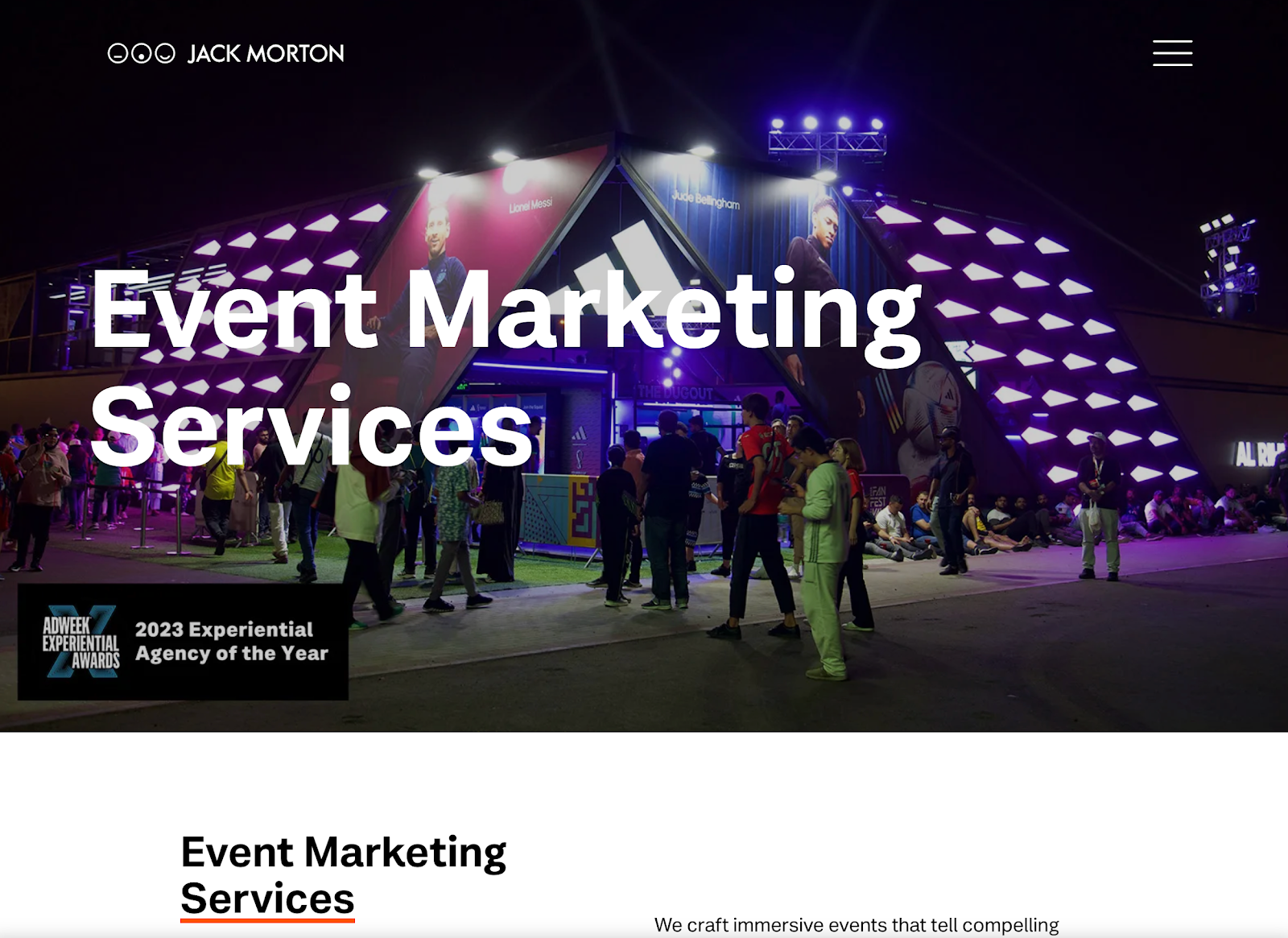
The very first step for starting a digital marketing agency is understanding your niche. While there's a lot of noise online telling you how to start a digital marketing agency with zero experience, it's actually a pretty important step to get good at a specific marketing discipline.
Sure, you can build up your skills by taking online courses, following YouTube channels and researching yourself - but it's important to narrow down your focus, at least initially. After all, you want to provide the best possible service to your prospective clients.
As your marketing agency grows, you can look to expand your services and your target market. For hands-on experience, you could even look for work with other digital marketing agencies, or in-house for a specific company.
Since the world of digital marketing can be quite competitive, it's important to nail your area of expertise. If you're already pretty skilled at web design and SEO services, there you have it. You've found your niche!
You can choose to narrow this down even further by targeting a specific industry. For example, Jack Morton (pictured above) focuses on event marketing, while the example below focuses on marketing for the construction industry.
Whether you specialize in a specific area of marketing (such as SEO services or social media marketing) or a specific industry (such as events), narrowing your digital agency down will make your mission clearer.
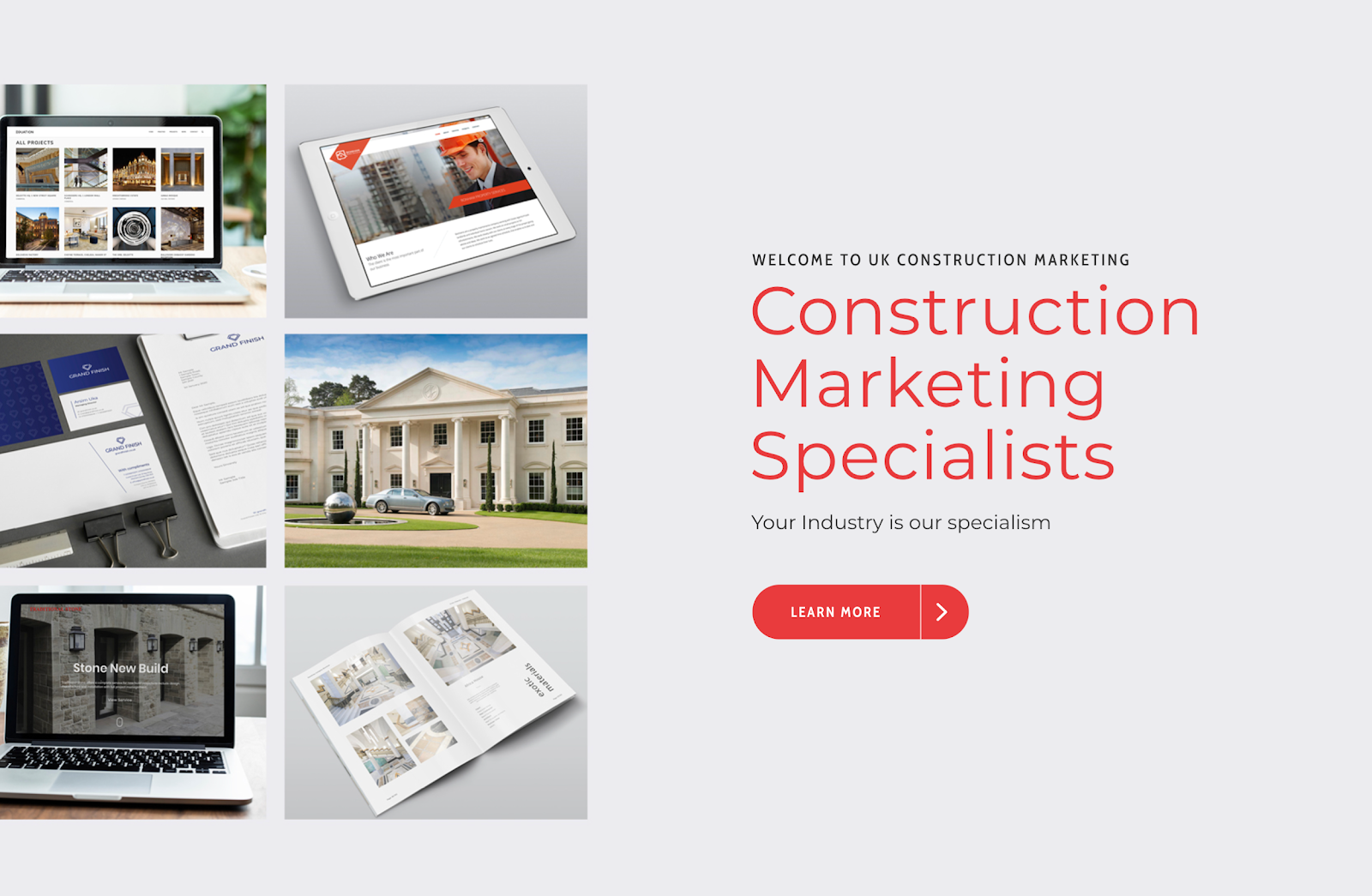
Overall, a digital marketing agency can provide a wide range of services, including:
- Social media management
- Content marketing
- Search engine optimization (SEO)
- Pay-per-click (PPC) advertising
- Email marketing
- Web design and development
By niching down - whether by services provided or industry - potential clients can easily understand what your digital agency does, and how you stand out from other agencies in the market.
If you're looking to niche by industry, here are a few you may want to consider:
- Fitness and wellness
- Non-profits
- SaaS
- Education
Before deciding, take a moment to analyze your competition. Look around at other agencies and see who they are targeting. While a niche might be quite narrow, if you do find a few competitors, it can tell you that this is a profitable industry to explore.
To get to grips with a niche even more, start talking to business owners in that industry to gain a better understanding of their pain points and the services they may be looking for.
Step 2: Package your services
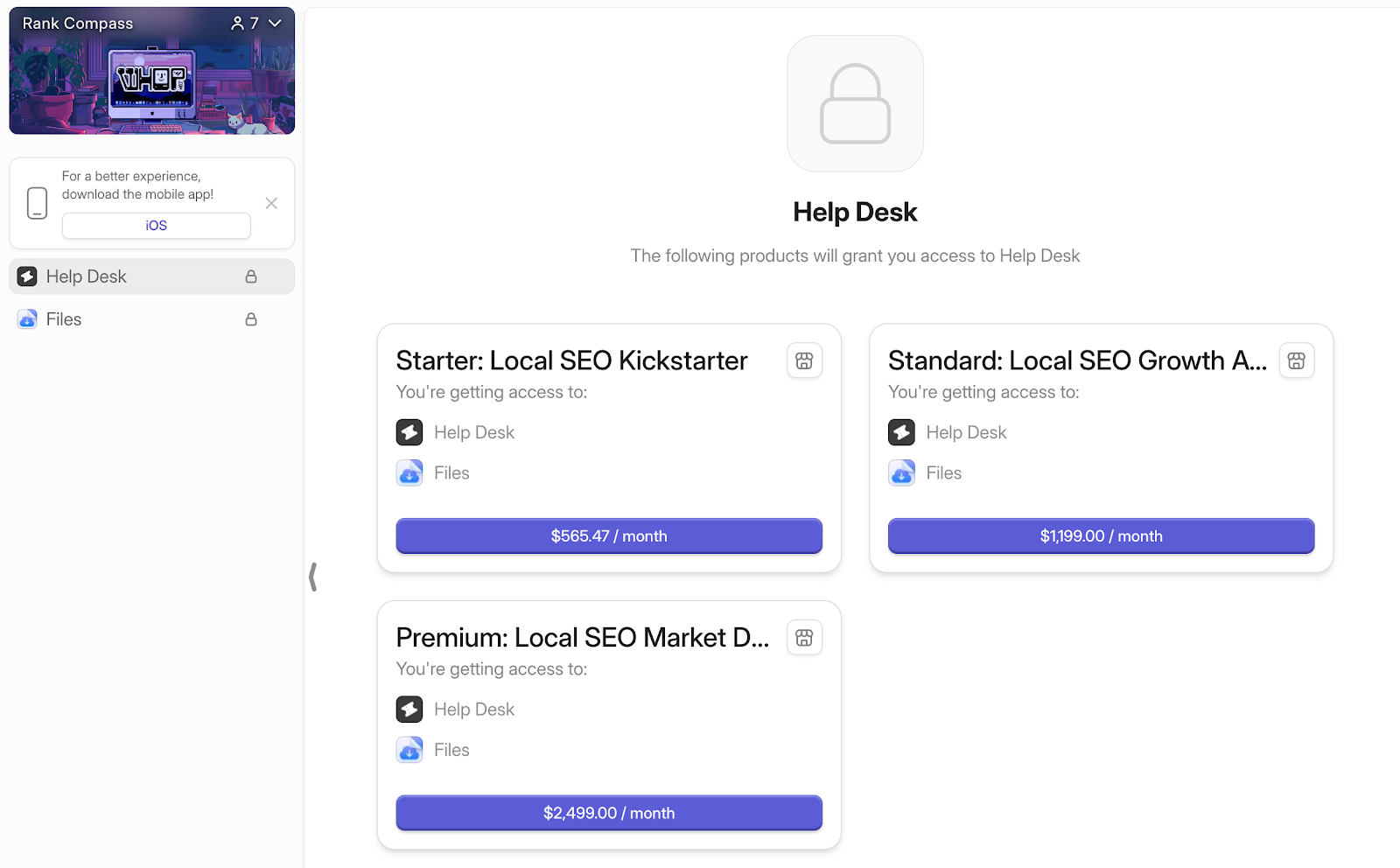
Whether you aim to work on a retainer basis, or provide digital marketing services ad hoc, it's important to package and price your services accordingly. Not only will this help you to define the parameters and pricing of what you offer, but it will also give you clarity on how to maximize your business potential.
For example, social media management can be incredibly broad. There might be platforms you prefer not to handle, such as LinkedIn or X (Twitter). If you were to focus your services around Instagram and Facebook, you need to make this clear in your packages and pricing model.
On Whop, you can package your digital marketing services into an easy-to-understand bundle. We can handle everything from taking payments, to connecting your whop to your favorite tools with webhooks - all from one platform.
Or why not take your digital marketing skills a step further? Create communities, paid courses and deliver digital products and services from your whop - all with no monthly fees.
Step 3: Set goals and key performance indicators (KPIs)

Before getting too carried away, you're going to want to set some goals for your new agency.
Here's your time to be realistic with your first year of running a digital marketing agency - but don't be afraid to aim high for the future. KPIs for digital marketing agencies can typically be grouped into three categories:
- Client KPIs - This can include your marketing spend to acquire new clients, as well as churn rate, conversion rate and upsell rate
- Financial KPIs - As an entrepreneur, you've no doubt got your eye on the prize. This is where you set goals for cash flow, accounts receivable days and gross profit
- Project KPIs - Working out your lead time per project, estimated vs actual project time and even estimated vs actual project cost
Step 4: Create a company and open a business account
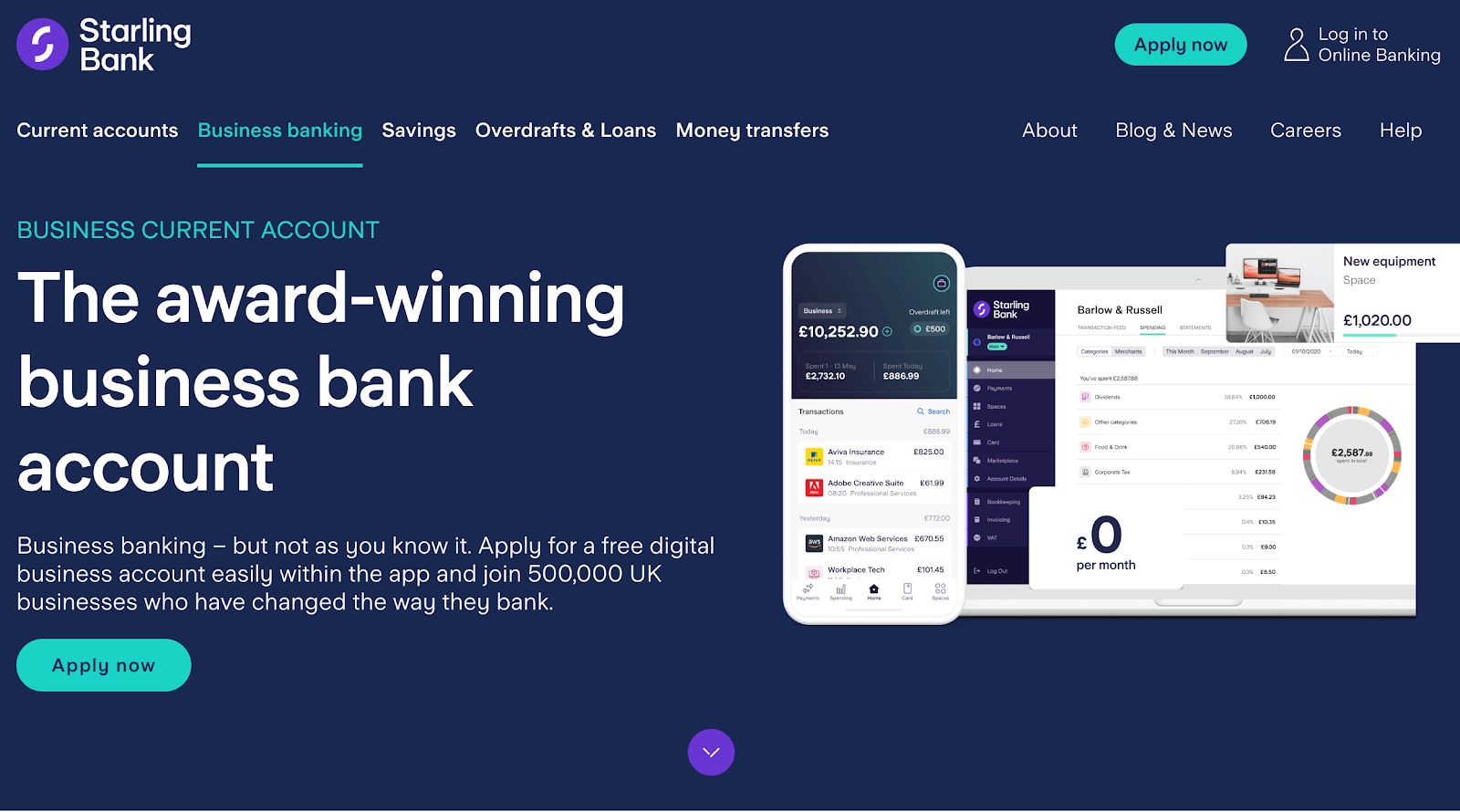
Now, this step doesn't have to be one of the first few of starting your digital agency. This is totally up to you. Many entrepreneurs get caught up thinking about this when they first start out, when there aren't even any sales in sight just yet.
Once you do have cash coming in, you're going to want to separate your personal finances and liabilities from your new marketing agency. If you prefer to set your business up right away, you can do this early on - or wait until you make your first sale.
You might want to speak to an accountant, depending on where you live, to get your business set up correctly. Many freelancers and digital marketing agencies open an LLC (Limited Liability Company), which will enable you to open a business bank account and start the process of separating your personal and business finances.
As a start-up business, finding the right software can make a huge difference to your processes as you become a successful digital marketing agency. From accountancy software to payment processors, there's a place for different tools in your agency.
Plus, many of these don't need to break the bank. For example, when you choose to use Whop checkout links to get paid, you'll pay as little as 2.7% + $0.30 in fees.
Step 5: Build a website for your digital marketing agency
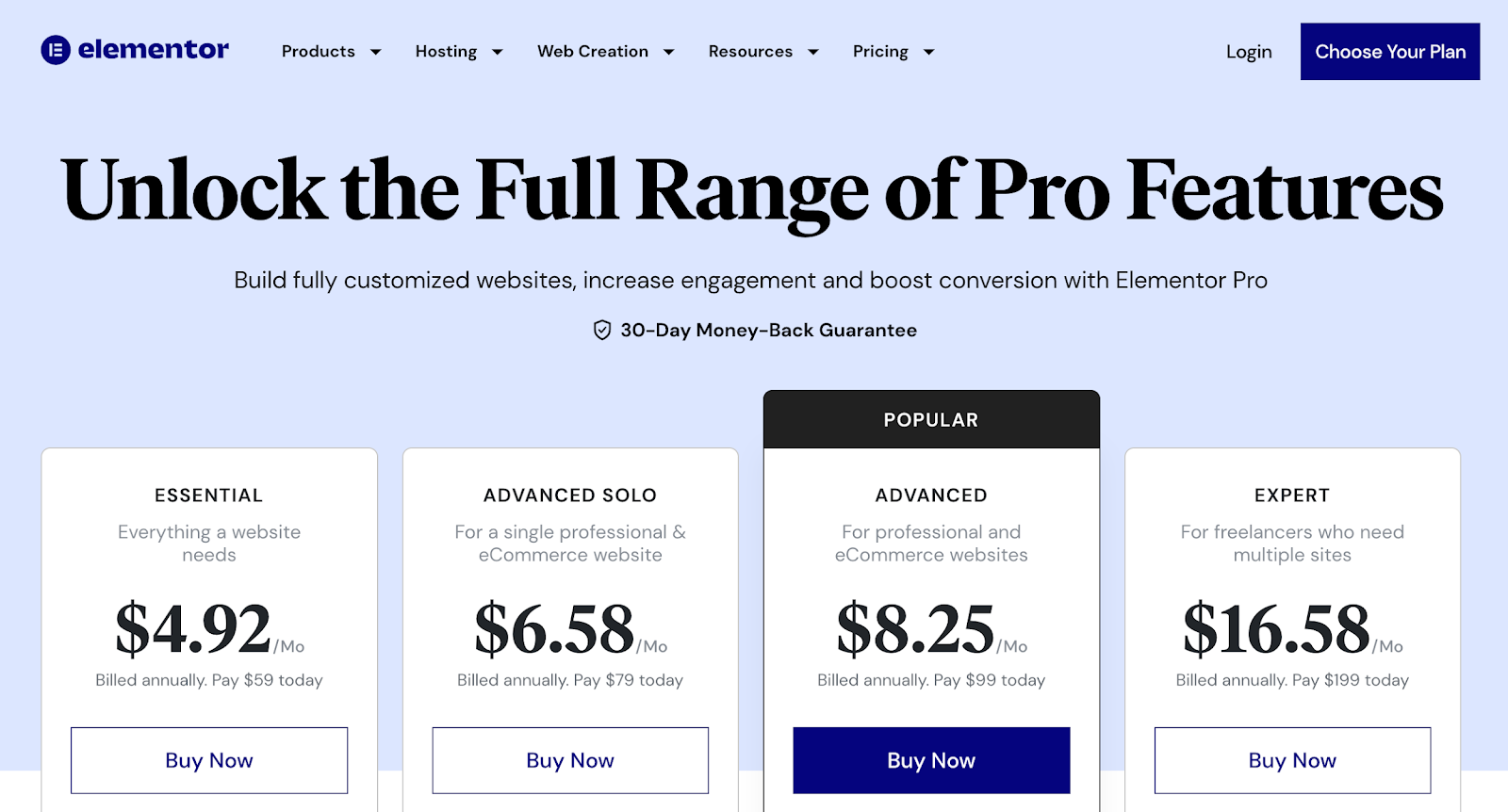
By now, you'll have your niche, services and business set up and ready to go. Now it's time to start building your own presence with a beautifully designed website.
Although not every business in the world has a website of their own, if you're starting your own digital marketing agency there's no denying that clients will expect to learn more about you online. This is your opportunity to market yourself, build testimonials and showcase projects you've worked on.
You can use a web builder like Webflow, Framer or WordPress to craft a professional website, or hire a web designer to build something custom. If you're looking to get started on a budget, your best bet is to use a template and adjust it accordingly to fit your brand.
Webflow vs Framer: Which is the best web builder for your business? We put the two head-to-head.
Want to learn new digital marketing skills you can later offer to your clients? Join Whop and learn from the best via courses, eBooks, exclusive files and get access to paid communities.
You can even use Whop as the home for your digital marketing agency and a storefront for your services. Your whop gives you room to engage with your clients, increase your brand identity, upsell your services and even cross-sell what you provide.
After all, not all clients will want you to look after their digital marketing. Some might be looking for guidance and consultancy services - making Whop the perfect space to build an online community, host live webinars and sell consultancy calls.
Step 6: Find your first client via outreach

Once you've decided on your niche and packaged your services accordingly, now it's time to find your first client. Finding new clients doesn't have to be a costly process of paid advertising campaigns, since one of the best ways can be via outreach.
Here are a few ways to get started:
- Leverage networking from previous roles
- Use LinkedIn to reach out to founders of companies you'd like to work with
- Outreach to companies you want to work with via cold email, you can even use tools like VoilaNorbert or Hunter.io to find company contact details
If you've got time and the skill set to do, you might want to consider offering a taste of your services to potential clients. For example, if you work in SEO, you could provide an article targeting a specific keyword to a company you'd like to work with.
Once they see what you can do, this could be the opportunity to grab your first paying client. At the same time, think about emailing the founder of companies you'd love to work with and give details on your ideas.
Step 7: Create a proposal and contract
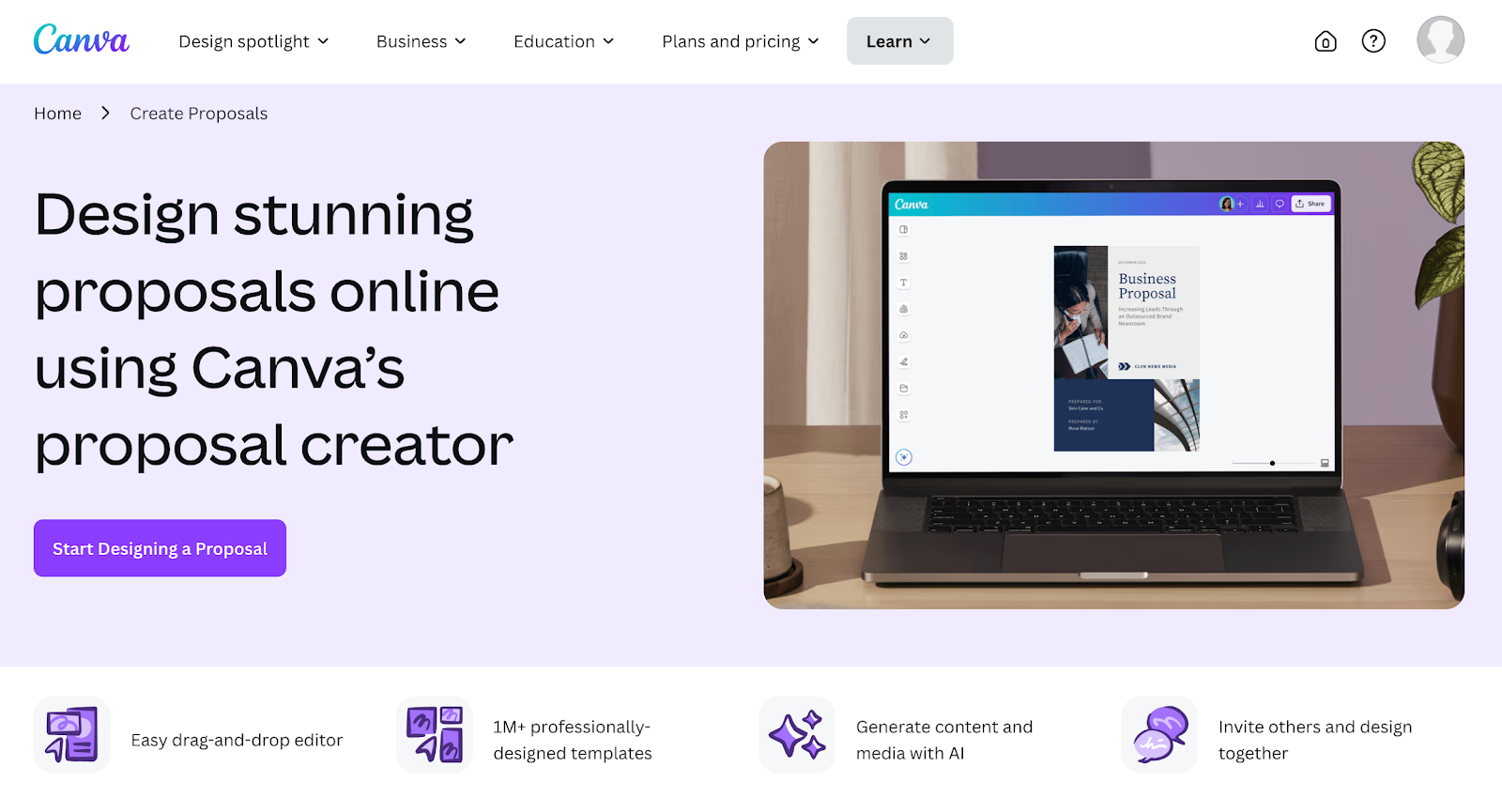
Now that you've built a relationship with a prospective client, the next step is to send them a strong marketing proposal and contract detailing your services, pricing model and deliverables.
There are multiple ways to create a proposal that not only includes everything you need, but also looks good. After all, if you ping over a boring-looking Word document, your potential client is likely to switch off right away. Thankfully, using online software to do this doesn't have to break the bank. Tools like Canva make it easy to create a custom proposal for free.
If you need to tweak your productized services slightly for a specific client's needs, this can be done to deliver a tailored proposal. Many digital marketing agencies will adjust the scope of their services to fit a specific client or industry.
At the beginning of your digital agency journey, you can experiment with different ways to present your proposal. Whether you're focusing on providing social media management or web design, you're going to want your proposal to look the part as well as include all the relevant information.
Not sure what to include? Here's a quick recap:
- Introduction - Here's the space to explain the problem, solution, costs and benefits.
- Define the issue - Cover the issue in more detail, the purpose of the project and any relevant background information.
- The solution - Detail your plan in a step-by-step manner and talk about how you will deliver these services to address the issue.
- Qualifications - This section isn't about providing a CV, but demonstrating your expertise as to why you're the best marketing agency for the project
- Conclusion - Cover costs, benefits and contact information so that the client can follow up with you.
If the client is ready to go ahead, they will likely ask you for a contract or provide you with one. This can depend on the size of the company you're aiming to work with.
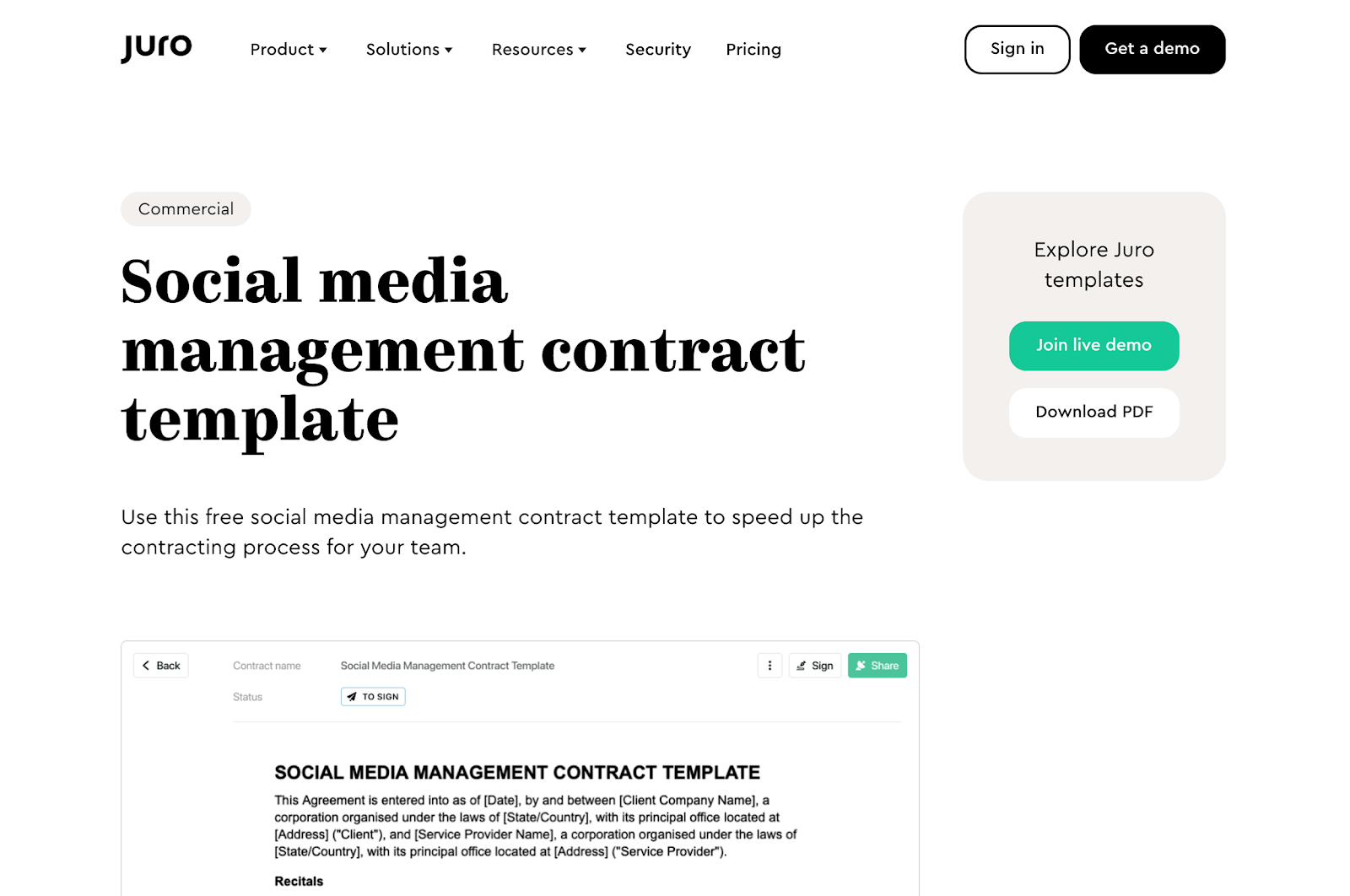
Creating a contract may sound scary, but thankfully there are plenty of resources available online to make the process easier. Websites such as Juro provide a bunch of contract templates that you can adjust to your service, deliverables and pricing model.
By this point, if the client is happy and ready to get started, it's time to onboard them.
Step 8: Onboarding

When it comes to running your own digital marketing agency, first impressions matter. You want to make the process as smooth as possible, making it easy for clients to work with you.
A smooth onboarding process will not only give a great first impression but will also help to keep things organized. If you're flying solo to begin with, you'll unlikely have project or account managers available to keep tabs on things.
However, finding a client portal platform can help you to run and manage your marketing agency. This will create a central place for you to manage things like contracts, invoices, tasks and oversee your projects.
Finding the right platform can make a huge difference to how streamlined the experience is for both your clients and your digital agency in its infancy. Here are a few options to explore:
- Copilot
- Notion
- Bonsai
- Moxo
Many of these types of tools will work to automate the onboarding process, while bringing everything into one place for easy management. From forms to reporting, communication and invoicing - keeping organized and demonstrating transparency with your clients will set your agency up for success.
Step 9: Set up billing and get ready to invoice
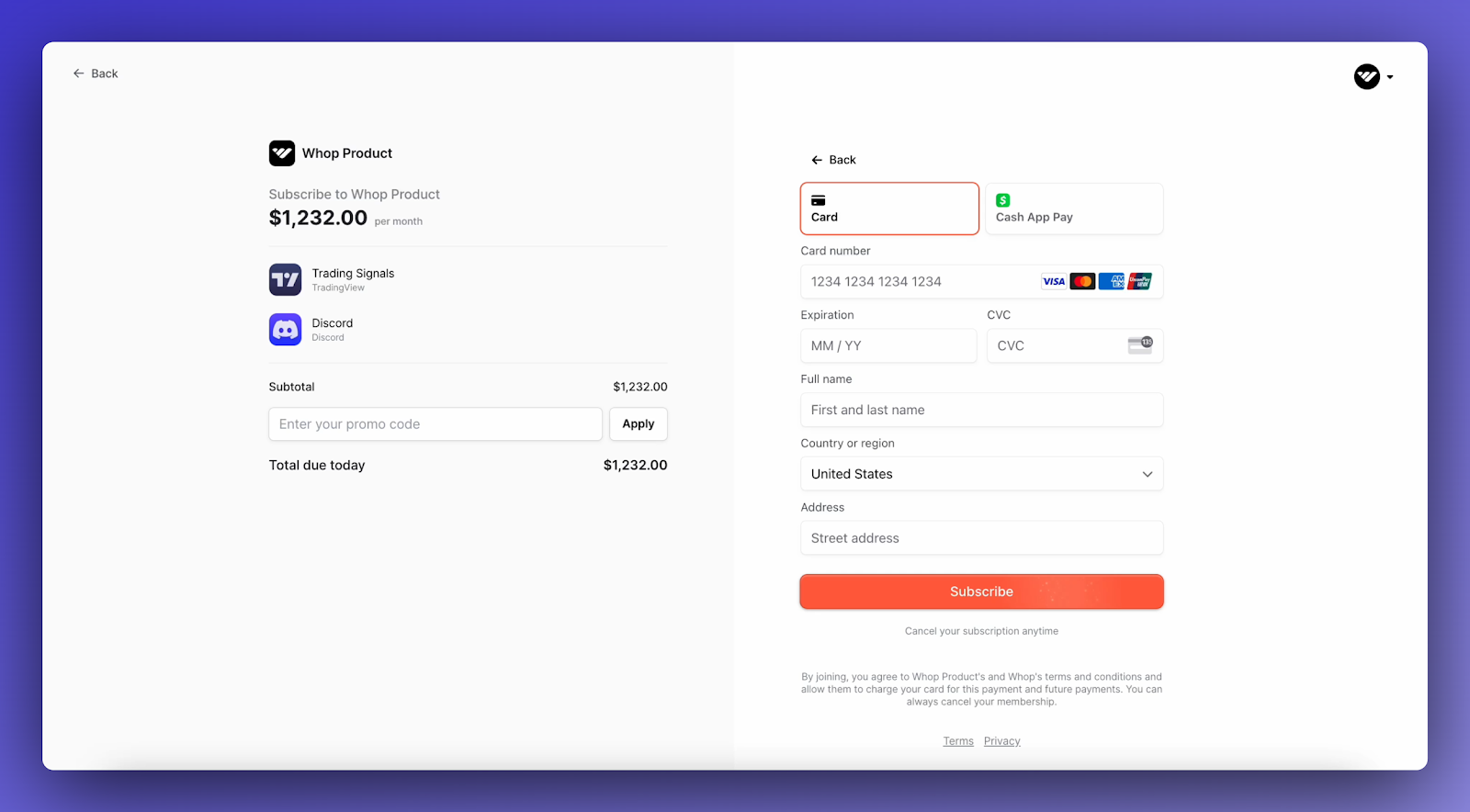
Once your client is onboarded into your portal, it's time to set up your billing process. This will depend a lot on your way of working. Some digital marketing agencies will choose to bill after the work is complete, request a percentage upfront or bill the entire project before getting started.
If you're working on a retainer basis, it's usually common practice to bill your clients at the end of each month. If you're providing ad hoc services or one-off projects, you might want to invoice as you go.
Once you've decided on your client portal platform, setting up the billing process is usually pretty easy. You may decide to provide your business bank details for payment, or use an online processor such as Stripe or Whop to take payments.
With Whop, you can create checkout links for specific pricing options that you can send to your clients. If you have your own website for your marketing agency, you can also add custom checkout links from your whop there too.
Step 10: Start creating case studies
Once you've got your website ready and results from your first client, it's time to show others what you can do.
Creating a case study on your website can provide social proof of your skills and successes, helping you to gain new clients. Here's the time to provide detailed information about the project, the challenges faced and how you overcame them. This will also give prospective clients an insight into working with you.
After a particular success or after a little while of working together, you can even ask your client for a testimonial. This could be a review on your Google My Business, or emailed to you directly for use on your website.
Now that you've got your case study together, start to share it online to attract more clients. You can do this via social media, sales presentations and pitches or even by sharing your success in your email marketing.
Start to build your mailing list via your website, then use email marketing tools to put together a newsletter with industry tips, insights and some of your top work. Here are a few email marketing platforms to look into:
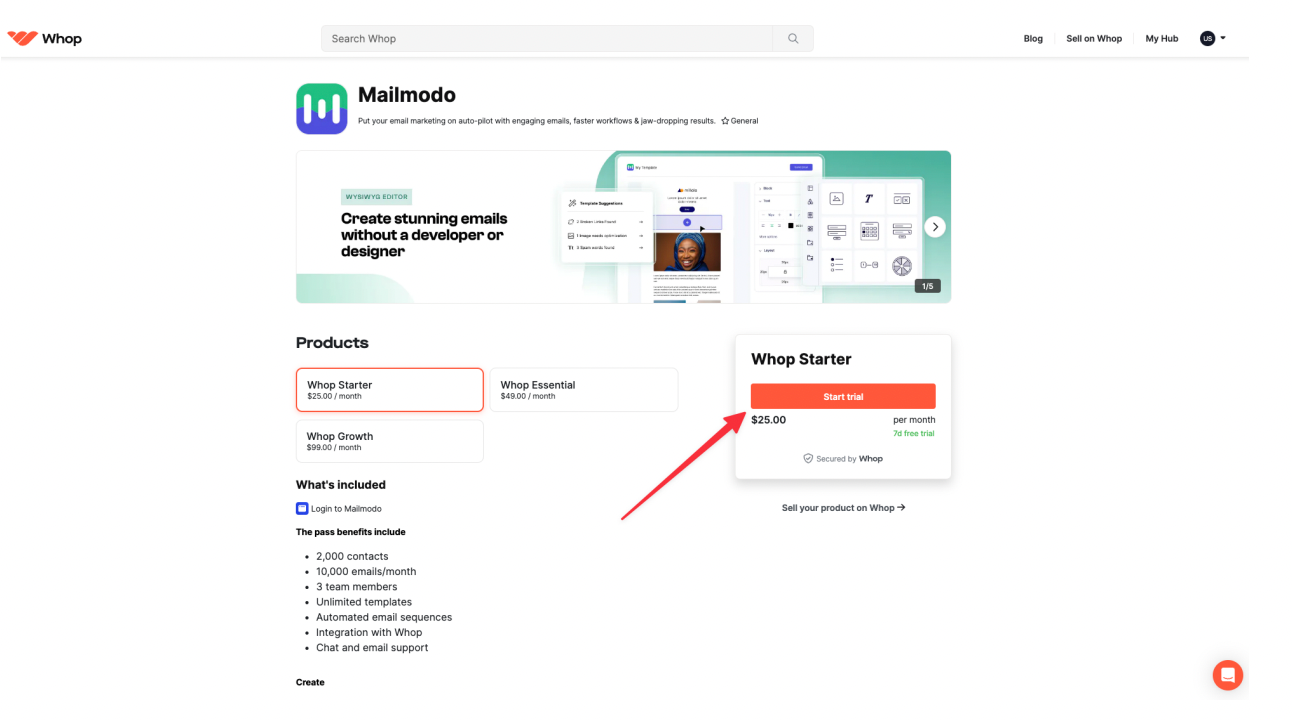
If you've already made Whop the home of your digital marketing agency, why not leverage Mailmodo for your email marketing campaigns? With the option to import your clients directly into Mailmodo's system, it has never been easier to get set up.
Simply purchase access through Whop, select your plan and generate a Whop API key. From here, you can create your own digital marketing campaigns and work on your content marketing.
Step 11: Scale your client acquisition strategy
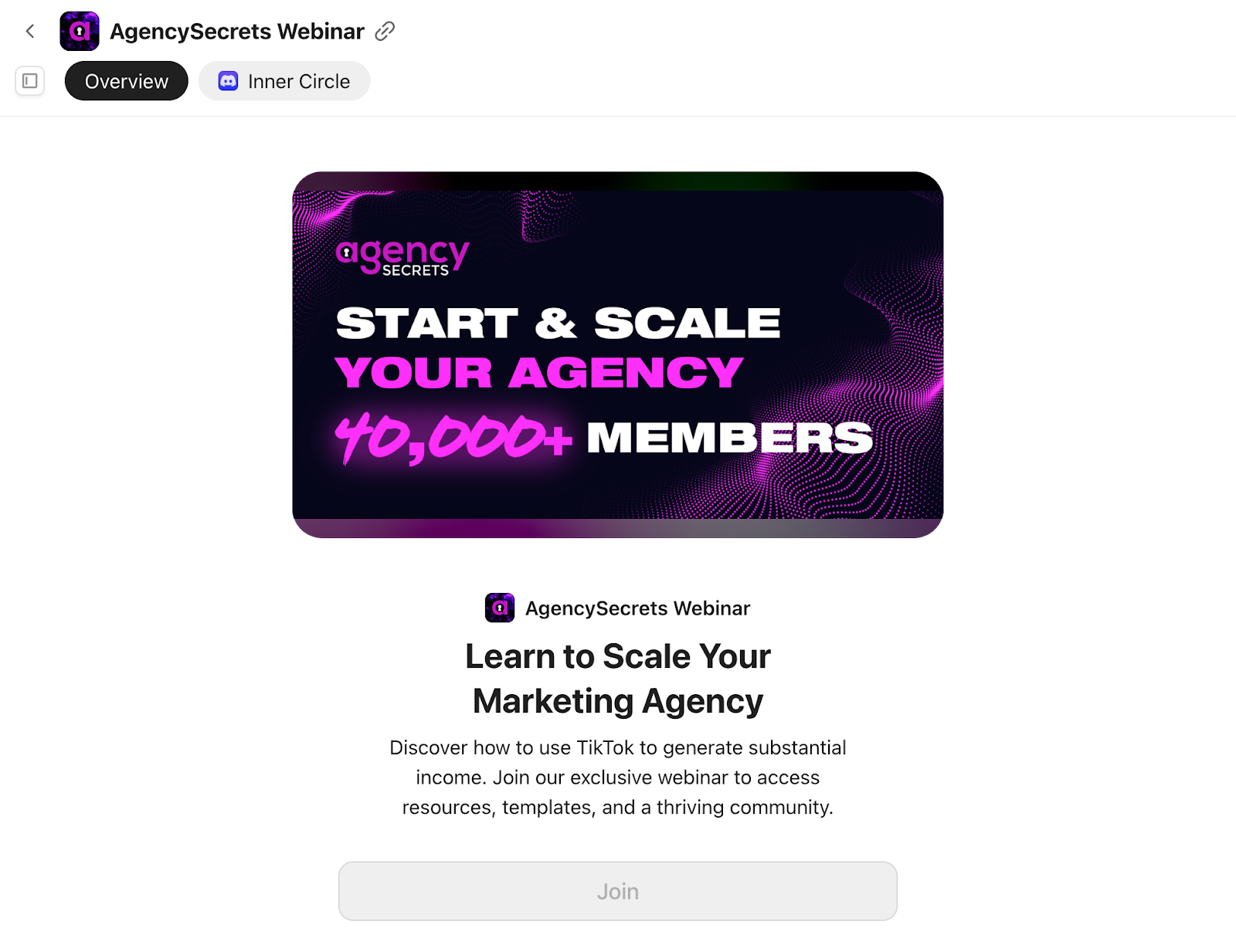
For any digital marketing business, signing your first client can feel like the biggest hurdle when starting. Once they're onboarded and their work is underway, it's now time to scale up your client acquisition strategy and maximize your revenue.
This may mean revisiting your business model and expanding your own marketing efforts to reach your target audience - while continuing to nurture your existing client relationships.
You can work to scale your client base by:
- Speaking to your existing clients for referrals
- Working on your content marketing and SEO by blogging and optimizing your website
- Running ads (you may need to seek help for the best possible results)
- Going to networking events
As we mentioned earlier, cold email marketing can also be carried out as you continue to grow your marketing agency. It's important to stay ahead in your industry and revisit your services, pricing model and overall approach to your target market.
How hard is it to run a digital marketing agency?
Like with any business, there is always a blend of challenges and rewards. If you want to start a digital marketing agency, it requires dedication and constant learning in an ever-changing industry.
Many digital marketing agencies face challenges as they continue to grow, whether it's acquiring new clients, maintaining projects or finding room for growth. However, if you persevere, the rewards are definitely worth the hard work.
But what can you do to make your digital marketing agency a successful business? For long-term success, it's important to:
- Stay ahead of the game and keep up with industry trends
- Continue to improve your agency's services and build client relationships
- Stay committed and focused on delivering incredible results for your clients
Grow your digital marketing agency with Whop
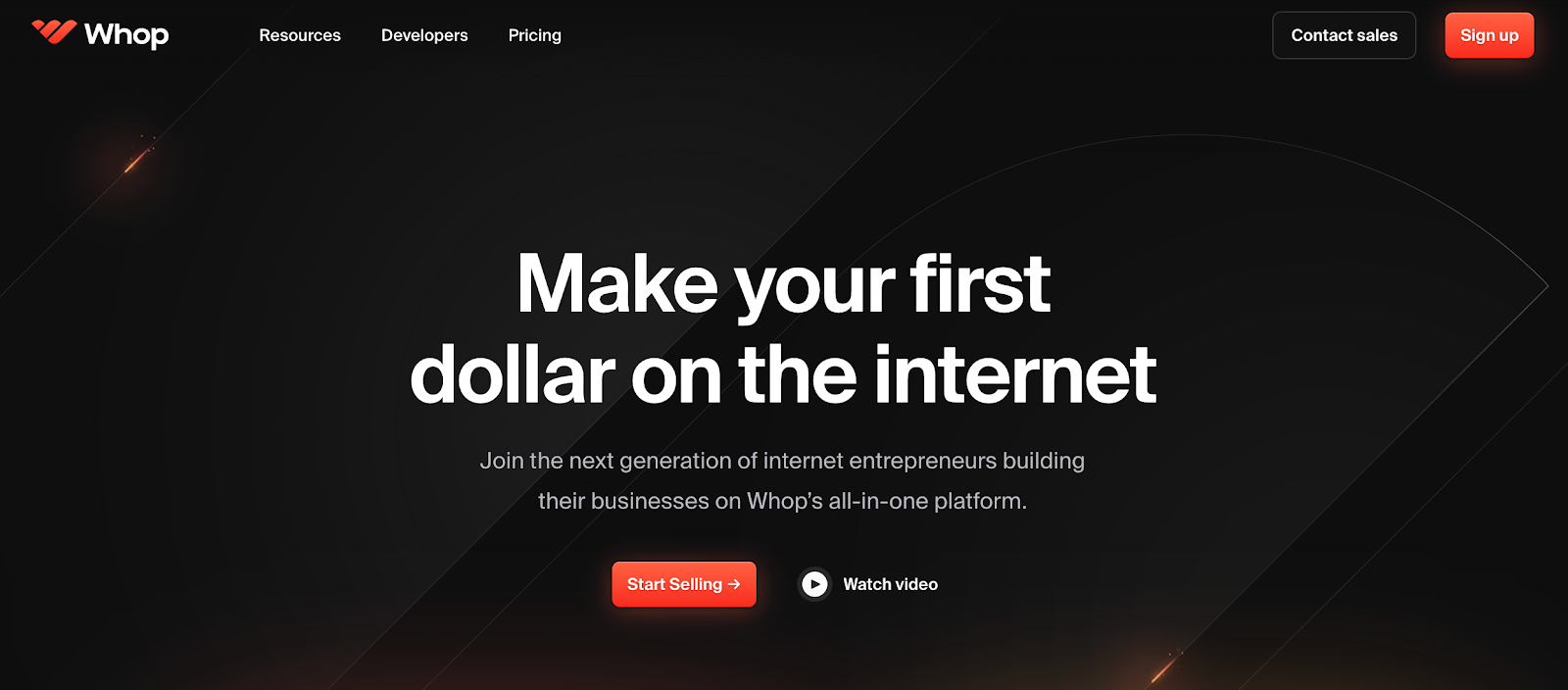
Now that you know the steps to building a successful agency, it's time to look over the steps above and work out your niche, your goals and the services you want to provide.
But why level up your marketing services with Whop? Whop makes it easy to package your services accordingly and deliver exactly what you promise to your clients. You can even build a community of your own via your whop - giving clients access to digital products that include crucial advice on growing their brands.
It takes just a matter of minutes to sign up and make Whop the home for your digital marketing agency. Get started today and grow your agency whilst learning from like-minded entrepreneurs on Whop.
FAQs for starting a digital marketing agency
Still not sure how to start a digital marketing agency? Or what to expect? If you've got further questions, don't fret - we've got the answers.
How much does it cost to start a digital marketing agency?
The costs of starting your own digital marketing agency can vary, anywhere between a few hundred dollars and a few thousand. This can depend greatly on a number of factors, including its size (if you aim to hire right away), location and knowledge level.
If you plan to work from home, you can quickly save on expensive overheads associated with renting an office space. Plus, if you already have a computer and WiFi, you're pretty much ready to get started online. If you need to invest in equipment, training or personnel, your start-up costs will naturally be higher.
Can you start a digital marketing agency with no money or experience?
Sure, you can. There are plenty of online communities and free digital marketing courses available to help you acquire the skills you need.
There are always challenges with starting any type of business - and a digital marketing agency is no different. While there will be a steep learning curve initially, as you gain more experience, your agency will naturally grow too.
Do I have to choose a niche for my digital agency?
While not every digital marketing business will choose to niche down to a specific industry they work with, they will typically select the services they provide carefully.
Of course, you can work to become a full-service marketing agency over time. But when you're at the very beginning of your journey you don't want to try and appeal to everyone and offer every service possible. This will result in spreading yourself too thin, and potentially not providing a top-quality service to new clients.
Instead, try to narrow down your focus. This may be a focus on content marketing and SEO, or social media marketing. Some social media marketing agencies for example choose to work with a specific target audience only, so they know exactly who they're speaking to.
Many digital marketing agencies start out with the concern that if they specialize in the services they provide, they'll miss out. This certainly isn't the case. You can start by specializing in your services to begin with, before finding the business niches you most enjoy working with.
What are the different types of marketing agencies?
Some digital marketing agencies choose to niche down by the services they provide. While others narrow themselves by their target audience. For example, an agency may provide just SEO services, while another could provide full marketing strategy services to just accountants.
Here are some different kinds of digital agencies to consider:
- SEO agency
- Content marketing agency
- PPC agency
- Social media marketing agency
- Email marketing agency
- Influencer marketing agency
- General digital marketing agency
You've likely heard of the term 'full service' before when researching marketing agencies. These are agencies that do just that - they provide a well-rounded approach to marketing.
This may include everything from graphic design to video content, web development or social media management. While some agencies handle all of these services in-house, many look to provide additional digital marketing services through a third party.
Want to know how much it really takes to start a business? Here’s what you need to consider.
Is it possible to find clients on a small budget?
Definitely. When you first set up your digital marketing business, landing that first client can feel pretty scary. It's tough, but totally doable.
Finding your first client doesn't need to break the bank. With the right mixture of dedication, professionalism and consistency, you can find clients that resonate with your marketing agency. This can be done via cold outreach (LinkedIn DMs for example), email marketing, or heading to networking events.
Since you're offering digital marketing services, think about your own business and how you can market what you do. Leverage LinkedIn to find company founders and CEOs, using tools such as VoilaNorbert or Hunter.io to build a bank of contact details - then you're ready to pitch.
A great place to start is to showcase your skills through content marketing and demonstrate to potential clients what you can really do. Think of your website and online presence as the storefront to what you have to offer. After all, if you walked into a physical store with empty displays and rubbish customer service, you'd walk right back out again!
Take this in your stride to provide a great foundation for your digital agency and once you've bagged your first client, work on providing not only a successful service, but also building strong client relationships.
Can I start a digital marketing agency on my own?
As a budding entrepreneur, starting a digital marketing business is incredibly exciting. It can be an exhilarating journey, and one that can definitely be undertaken solo.
However, depending on your skill set, you may need to get a little help along the way. For example, if you don't know much about website design, you may want to seek assistance from a web designer to ensure your new agency's website looks professional.
If you're working on a tight budget, you can look to learn basic web design yourself via online communities, courses and even YouTube.
New to digital marketing? Our best advice is to master a specific skill before expanding on your services. In order to keep things streamlined, especially when working independently, you may want to invest in and maximize online tools. This may be:
- Automation tools such as Zapier to connect multiple platforms
- An all-in-one commerce platform to sell your services, such as Whop
- Social media scheduling tools, such as Later
Whop makes it easy to package your services and get paid. With fees as little as 2.7% + $0.30, you can focus on growing your new digital marketing agency. You can even onboard your clients into exclusive communities, while offering valuable insights via digital downloads, ebooks and video content.
Looking for the best social media management tool? See how Sprout Social and Hootsuite compare.
Is running a digital marketing agency a profitable business?
If you're thinking of starting a digital marketing agency, profitability is naturally going to be one of your main concerns. Put simply, yes, a marketing agency can be a very profitable business.
Profit margins can vary on the services you offer, and whether you need to outsource any work. However, with so many digital marketing agencies working remotely, there are plenty of opportunities to reduce overhead costs and focus on your deliverables.
As you expand your skill set, your digital agency can work to provide new services - enhancing your profit options even more. Once you've obtained clients, there is always room to upsell your offering and expand upon existing client relationships.
Do I have to have a website for my marketing agency?
While it's not compulsory to have a website of your own, it can definitely help to build social proof for your agency. However, there are other ways to sell and market your services.
Whop is an all-in-one social commerce platform that makes it easy to package your services and sell them online. Whop can take payments, help you build communities and support you in expanding your services with digital products, including ebooks, paid files and even exclusive video content.
How can I work to grow my digital marketing agency?
Using platforms such as LinkedIn and Facebook can help you spread the word about your agency, and quickly provide potential clients with social proof. Being active on social media platforms is especially important if you intend to provide social media marketing services.
After all, why should clients trust you to run their social media campaigns and grow their following, when your own accounts aren't being maximized?
Although it takes time to grow a marketing agency, a combination of inbound and outbound marketing strategies should be your focus for promotion. These including:
Inbound marketing
- Blog posts
- Infographics
- Email marketing
- Webinars
- Social media marketing
- SEO
Outbound marketing
- Paid advertising campaigns
- Cold email
- Press releases
- Direct mail
- Banner ads
- Print ads
You'll see here that several of the outbound options require a little more budget. While these are possible for a newbie marketing agency, you may want to seek the help of third parties to ensure your spending delivers maximum return.



